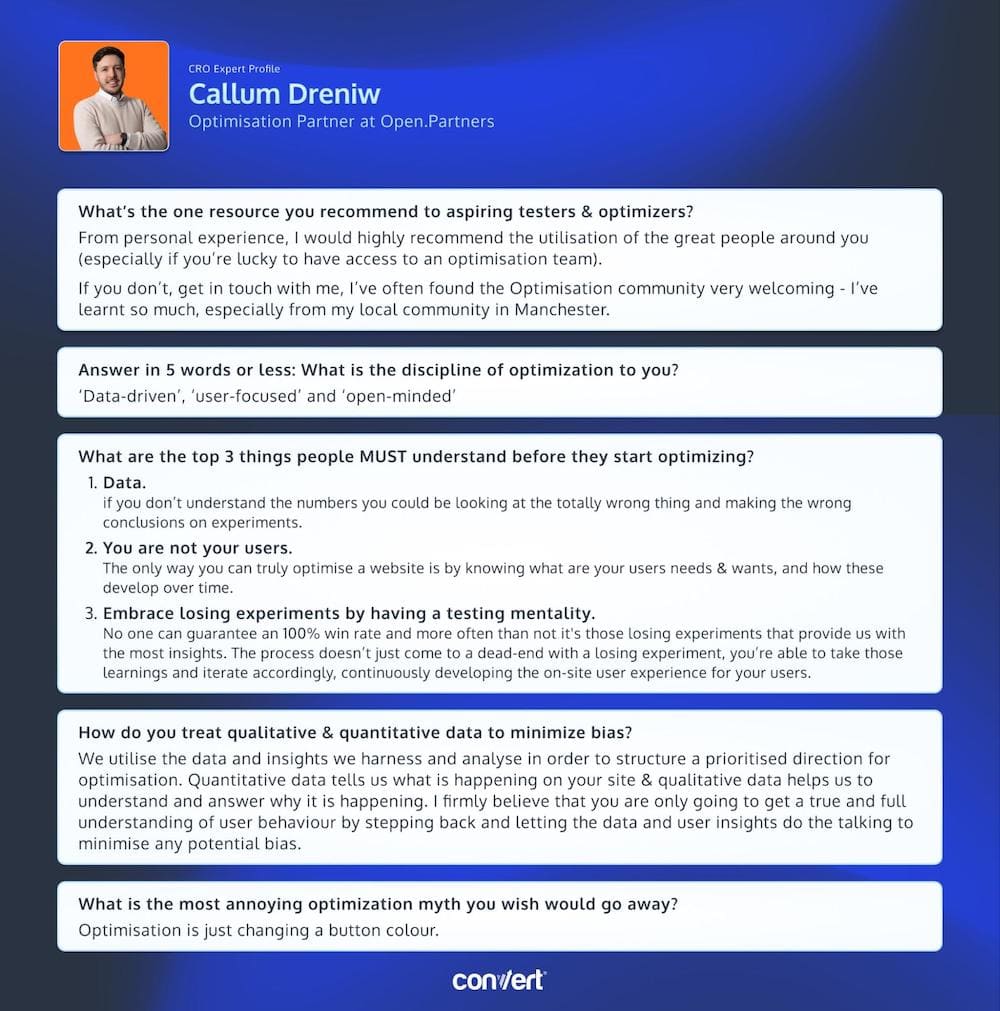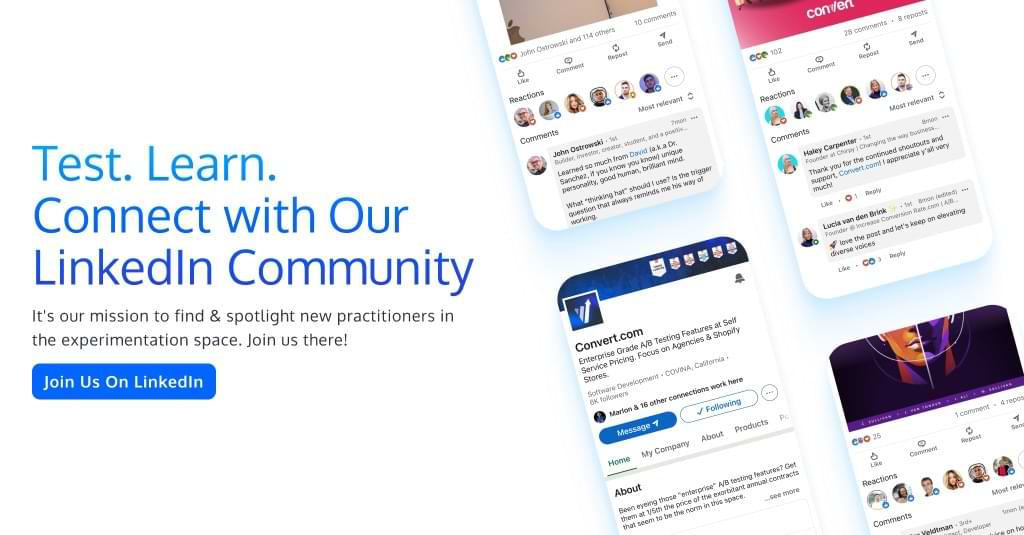Testing Mind Map Series: How to Think Like a CRO Pro (Part 49)
Interview with Callum Dreniw
Callum Dreniw is the Optimisation Partner at Open Partners. With 7+ years in the experimentation space, Callum switched gears from being a web developer to CRO, all thanks to his love for user experience and data.
When asked about the essence of optimization, Callum boiled it down to three simple truths: 1. Master the data or you’ll miss the big picture. 2. Always keep in mind that you aren’t your users and need to tune into their ever-changing needs. 3. Embrace the value in failed experiments; it’s not about winning every time but learning.
Join us as we explore Callum’s insights…
Callum, tell us about yourself. What inspired you to get into testing & optimization?
Hi, I’m Callum Dreniw, Optimisation Partner at Open Partners.
I’ve been part of the CRO industry for over 7 years, currently heading up the CRO team at Open Partners. My primary focus is leading our fantastic team to continuously provide excellence in the field of experimentation for our clients.
Originally I solely undertook a web developer role after graduating from university, where I built, coded and developed websites without analysing data or utilising any user insights. Knowing that I didn’t want to be a day to day developer, I opted to learn a variety of aspects related to user experience previously touched on at university. I’d always wanted to explore more, so with this in mind I dived head first into the CRO industry and have never looked back.
In my opinion, the scientific approach for making on-site adjustments is so powerful. By making changes before our very eyes directly on a website, the CRO magic casts its spell allowing me to generate my own story by hypothesising an experiment idea, creating the visual designs, coding the experiment to life & analysing the data for the outcome.
When working as a CRO pro, no two days are the same. I love the constant waves of activity and movement from one aspect to another. The continuity of the team and the freshness of new ideas and creations. Whilst the office may stay the same, the power of Open Partners’ creativity and logistics can create something truly spectacular.
How many years have you been optimizing for?
My CRO pro journey began in 2016 totalling just over 7 years of expertise.
After starting originally at a global agency, I took the leap to the fast-growing Optimisation Team here at Open Partners over 2 years ago, something that I am very proud of. Here, not only have I grown considerably both professionally and personally but our clients have been left extremely happy and proud of the work we have done to better represent them and their companies.
What’s the one resource you’d recommend to aspiring testers & optimizers?
From personal experience, I would highly recommend the utilisation of the great people around you (especially if you’re lucky to have access to an optimisation team).
If you don’t, get in touch with me, I’ve often found the Optimisation community very welcoming – I’ve learnt so much, especially from my local community in Manchester.
Answer in 5 words or less: What is the discipline of optimization to you?
‘Data-driven’, ‘user-focused’ and ‘open-minded’
What are the top 3 things people MUST understand before they start optimizing?
- Data; if you don’t understand the numbers you could be looking at the totally wrong thing and making the wrong conclusions on experiments.
- You are not your users; the only way you can truly optimise a website is by knowing what are your users needs & wants, and how these develop over time.
- Embrace losing experiments by having a testing mentality; No one can guarantee an 100% win rate and more often than not it’s those losing experiments that provide us with the most insights. The process doesn’t just come to a dead-end with a losing experiment, you’re able to take those learnings and iterate accordingly, continuously developing the on-site user experience for your users.
How do you treat qualitative & quantitative data to minimize bias?
We utilise the data and insights we harness and analyse in order to structure a prioritised direction for optimisation. Quantitative data tells us what is happening on your site & qualitative data helps us to understand and answer why it is happening. I firmly believe that you are only going to get a true and full understanding of user behaviour by stepping back and letting the data and user insights do the talking to minimise any potential bias.
What is the most annoying optimization myth you wish would go away?
Optimisation is just changing a button colour.

Download the infographic above and add it to your swipe file for a little inspiration when you’re feeling stuck!
Our thanks go out to Callum for taking part in this interview! To our lovely readers, we hope you found the insights useful and encourage you to apply them in your own optimization efforts.
Don’t forget to check back twice a month for more enlightening interviews! And if you haven’t already, check out our past interviews with CRO pros Gursimran Gujral, Haley Carpenter, Rishi Rawat, Sina Fak, Eden Bidani, Jakub Linowski, Shiva Manjunath, Deborah O’Malley, Andra Baragan, Rich Page, Ruben de Boer, Abi Hough, Alex Birkett, John Ostrowski, Ryan Levander, Ryan Thomas, Bhavik Patel, Siobhan Solberg, Tim Mehta, Rommil Santiago, Steph Le Prevost, Nils Koppelmann, Danielle Schwolow, Kevin Szpak, Marianne Stjernvall, Christoph Böcker, Max Bradley, Samuel Hess, Riccardo Vandra, Lukas Petrauskas, Gabriela Florea, Sean Clanchy, Ryan Webb, Tracy Laranjo, Lucia van den Brink, LeAnn Reyes, Lucrezia Platé, Daniel Jones, May Chin, Kyle Hearnshaw, Gerda Vogt-Thomas, Melanie Kyrklund, Sahil Patel, Lucas Vos, David Sanchez del Real, Oliver Kenyon, David Stepien, and our latest with Maria Luiza de Lange.
Written By
Callum Dreniw
Edited By
Carmen Apostu


